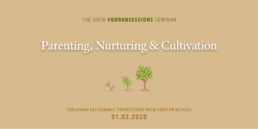Protecting ourselves
6 min read
For years, many of us have spoken about the need for British Muslims to prepare themselves in the (martial) combative arts, both as an engaging way to keep fit (for some simple exercise is boring), and to provide a means of defence for ongoing anti-Muslim and racist physical abuse that heightened particularly after the 7/7 atrocity. And yes, it wasn't a matter of mere advocacy, we did it ourselves.
More recently, I've been asked as to why it hasn't taken root in the faithfuls' culture. I'd say:
QSS 6: Parenting, Nurturing, and Cultivation
Some of the things we'd like to cover:
What is a parent, and what is parenting?
- Case studies of parents: Luqman, Abraham, Jacob
- Case studies of offspring and young people: Joseph, Jesus, Ishmail, the Companions of the cave
What does it mean to nurture? Who does it apply to?
- What is tazkiyah in this context?
- Educating and instilling manners and morality
- Protecting children (and from what).
- The importance of linguistic competency
What is cultivation (tarbiyyah)? And what is its relationship to godliness (rabbaniyyah)?
- What are we preparing young people for, and how does that shape what we do now?
Date: Saturday 1st February 2020.
Time: 11am-3pm.
Venue: Hackney CVS, 24-30 Dalston Lane, Hackney, London E8 3AZ
Refreshments provided.
To confirm your place, book below:
Three current approaches to religion
3 min read
Studying the variant approaches people take in their religion, on the ground and in my experience, there seems to be three overarching approaches that inform how their religion will be practiced and how it will look both in their daily lives and in society (including public discourse). Simplistically put:
- Revelation-based reasoning
- Ritualism (often, but not always, in the form of reductive literalism)
- Cultural reasoning
All three are very broad churches, and of course the boundaries between them aren’t precisely definable.
A brief breakdown:
(1) attempts to locate and apply meaning and purpose to acts of subservience, assuming that God has told us things for a reason/purpose, which should then inform how we do it so as to bring out optimum outcomes, and in a way that is coherent with the rest of the shariah.
(2) settles for ‘doing for the sake of doing’ and rarely assumes things to have meaning and purpose, and so how religious acts should be enacted is mainly dependent on (Arabic) linguistic constructions because the greater picture it feeds into is deemed unknown, irrelevant, or to not exist.
(3) makes assumptions about the shariah, interacts very little with revelation, and views faith through a secular prism as a cultural phenomenon. As such, faith is evaluated against the benchmark of modernity, its shifting moral trends and popular opinion.
The distinct methods that come out of this are: (1) revelatory authority (2) persona authority (3) modernity’s authority.
(1) constantly roots everything in God’s explicit discourse, navigating through various statements and dictates in order to find nuanced conclusions and locate the attitude of God towards that matter - it does not negate the way scholars of the past have deliberated, but also doesn’t arbitrarily afford them the last word, and instead understands them as humanly seeking to do the same - thus they serve as a valuable heuristic resource.
(2) sees sole authority in the interpretations of particular men and the validity of religious conclusions are rooted in the given authority of those men. (The men will differ depending on the sect/denomination). This is because there is no other ‘valid’ pathway to determine what God wants. Divine discourse is treated as dictates that have little worldly meaning/purpose since it is held that only the ancients understood their true meaning, and thus, we must be subservient to their (often contextual) conclusions, irrespective of whether their reasoning works or their conclusions make sense today. Consequently, this approach enacts subservience to God as manifested in the medieval period and does not account for later-arising variables that’d shape the particularities of such subservience today. Since ritualists do not apply reason, antithesis to things is often presented in the form of a moral panic and with fallacious analogies.
(3) sees little authority in anything, often faith is a subjective phenomenon based on a ‘blind leap’, a theism which is informed by humanistic philosophy, and assumptions as to what God wants are based on the social norms of the moment.
Interestingly, often it is only the third group viewed as the secular type, yet many of those who appropriate the markers of religious conservatism (group 2) also fall into this since Islam becomes a political identity marker where they are driven to conform to the social norms/groupthink of their particular sect.
(The purpose of this post is to provide a general overview to initiate some introspection)
"That's changing the deen!"
Whenever a question about motive or meaning is asked concerning the sharī’ah which sits uncomfortably with the cultural preachers who don't have a reasoned position, they holler "so and so is trying to change the deen!" Many then mindlessly adopt this rhetoric, erroneously railing against legitimate rectification and exploration. Now had religious literacy amongst the masses not have been so low there might be some basis for this claim, but it is essentially ignorance that becomes the criterion of truth. Of course, there ought to be some balance: on the one hand the laity must be careful not to follow every claimant in their fanciful views: "There are some who, with no knowledge, argue about God, who follow every devilish rebel" (22:3), but at the same time they must be able to transcend irrational, spurious or irrelevant traditions: "But when it is said to them, ‘Follow the message that God has sent down,’ they answer, ‘We follow the ways of our fathers.’ What! Even though their fathers understood nothing and were not guided?" (2:170)
I'm continuously asked: "How are the laity meant to know?" Well, to put it simplistically, having some general literacy of the Quran is a good place to start so that you can take what you hear and judge whether it resonates with the general nature (and entirety) of the divine message. And once lay people start to actually pay attention to what advocates are saying along with the depth of their arguments (rather than relying on sectarian rhetoric or cultural conformity) then I believe they'll start to recognise the range of standards and abilities out there, and discern the real from the pretenders.
In our context today, religious opinion is largely uninformed, social opinion judgemental, and political opinion either baseless or grievance driven. Most are led to believe there has only been ONE mainstream opinion on everything for a millennium. Yet there is nothing mainstream and traditional about contemporary religious rhetoric, in fact it’s very new and reactionary (mostly as a post-colonial force). One of our aims should be to revive the traditional realm of religious opinion that we so staunchly claim a commitment to, and challenge the provincial attitude that has become the status quo.
Those who position themselves as gatekeepers of the Qur'an and sunnah are no such thing; more than often they distort verses with mistranslations or misinterpretations, and as much as they claim the tradition of the past's ulama, they intend that you only follow their way, reducing the entire edifice of intellectual shar’ī thinking over a thousand years to the specific 3-4 people they've chosen to take as interpretative authorities. All sects and denominations do this, it's intrinsic to their nature. It's nothing new. Many hundreds of years ago, Ibn Taymiyyah addressed the same issue:
ومن الناس من يكون نشأ على مذهب إمام معين، أو استفتى فقهيًا معينًا، أو سمع حكاية عن بعض الشيوخ، فيريد أن يجعل المسلمين كلهم على ذلك
And there are some who develop (their views) according to the school of a particular Imam, or only seek answers from a particular jurist, or hear from some shuyukh, expecting ALL Muslims to be just like that.
Note that the problem isn't with seeking a simple approach - it can actually be praiseworthy, but it's with imposing one's own personal choices on others as matter of fact. And this becomes particularly heinous when religious leaders/personalities do so, since irshad (religious guidance) requires from them wider learning, deeper understanding, and consideration of the variables that affect the context. We might sympathise with the parochialism of the unlearned, but when religious personalities advocate it, then they establish for us that they're pretenders.
Some general thoughts:
1. What God has revealed is known: "We have sent down the Quran Ourself, and We Ourself will guard it." (15:9) None can change that. What the righteous endeavour to do is challenge how it is misunderstood and how some want us to parochially understand what God wants from us, or the fact that some don't want us to understand God at all and instead want us to opt for irrational religion/faith as an extension of an ethnic identity, religio-cultural practices, or their fear-driven 'orthopraxy'.
2. It's not something the learned are at liberty to overlook (no matter how much they might want to and instead opt for a simple life). It is their duty and their responsibility. Abu Huraira reported: The Messenger of God said, “This knowledge will be carried by the trustworthy of every successive generation, refuting the corruption of extremists, the distortions of falsifiers, and the interpretations of the ignorant.” (al-Tabarānī)
3. Seeking meaning and guidance from God and His messenger is something both progressives and the cultural preachers abhor. For the former, it absolutely undermines their superficial claims, and for the latter it divests them of the positions they occupy in their communities and places it back with God. They no longer get to control the masses, since it is through raising educational standards that the masses are empowered with some evaluative tools, at least to separate the wheat from the chaff. The motives of such preachers reflect those of the earlier Church which positioned priests as middlemen between God and humanity. How else can we explain the inane idea "If you read the Qur'an to understand it, or in a language you understand, you'll be misguided!"
4. The majority of our established practices are valid, but because we have lost much of their meaning, the substance of what we do and believe is insipid. Speaking about the why informs the how. Take the tarawih as an example, a perfectly valid and meaningful form of worship, yet being superficially committed to 20 rakat (units) as a doctrinal code means that many mosques offer prayers with such haste and empty movements that the entire 20 rakat are rendered meaningless and offensive. Had what God wanted from Ramadan night prayers been understood and explored appropriately, I doubt most (who do) would behave this way.
Are Arabs the best scholars, just because they’re Arabs?
6 min read
I rail against paternalistic Eastern (Arab and Asian) superiority and the infantilization of Muslim westerners. To be clear, this isn’t to negate the obvious fact that there are scholars in the Middle East nor that we cannot benefit from the good it has to offer (like anywhere else), but I'm briefly addressing an ongoing presumption amongst many Muslims in the west that eastern is better merely because it is eastern. This is in some part built on a fetishization of the Middle East and particularly by those who don’t have any actual experience of what education there is like. For many, it is a mystic land in which scholars attend mosque circles in all their regalia and scholarly glory, ruminating deeply on the Quran, hadith, fiqh, usūl, aqīdah, kalām, etc. Yet this depiction couldn’t be further from the truth.
There is nothing intrinsic to Arabness that elevates the Middle East's ability to engage in Islamic scholarship at a higher level. In fact, Islamic history attests to the fact that Islamic intellectual development, in all shar’ī realms was mostly the domain of non-Arabs. Ibn Khaldun famously wrote:
Is hijamah (cupping) sunnah?
5 min read
This brief post deals with the idea that hijamah (cupping) is mustahab (encouraged in the shari'ah). The point I make here is that it is not.
Cupping is an ancient medical practice that was practiced long before the Arabs, such as by the ancient Persians, Chinese and Egyptians, and something the Arabs widely practiced before the advent of prophethood. It wasn’t particular to the Prophet, nor was it a treatment that was specially 'revealed’ to him (I deal with the hadith on angels later on). The vast majority of classical jurists held that cupping was a form of treatment for those in need and not an habitual practice, and as such, viewed it (a) as scientifically the best medical treatment available (and so, mustahab in that sense), and (b) neither a metaphysical nor ritual phenomenon.
Voting is polytheism?
I've been meaning to put something down that discusses democracy, shirk, the political engagement of Muslims in the UK, and so on. Given that the British General Elections are around the corner (12th December), once again anything I do now will be somewhat reductive. However, this is an ongoing and broad topic, and one I hope to fully address at some point. (The problem is that there doesn't seem to exist, as far as I'm aware, an entire narrative offering complete education on this topic, so everything always comes across in scattered tidbits that continues the confusion).
However, some have felt that there is some benefit in making the following brief points about the voting-is-shirk rhetoric, so here it is:
The idea that voting is shirk/kufr is theologically absurd. Some will say, “I respect the view but…/You have a right to that view but...” however there's nothing to respect from an ignorant position: it is devoid of shar’i knowledge, context, the Qur'an, the sunnah, and the insights of a thousand years of theological enquiry - let alone the nefarious implications of mass takfir. As a friend pointed out recently, the biggest problem with all the debates surrounding voting and engaging with people who think they have a shar'i argument is that they tend to premise their arguments on ideas that are used without clear parameters, like 'man-made law', hakimiyyah (God's sovereignty), al hukm bi ghair ma anzallallah (judgement by other than revelation), al Islam yaʿlu wa la yuʿla (Islam overcomes), etc. "Its just sloganeering, and how can one have a meaningful uṣūli discussion with someone who sloganeers??"
“You can’t vote for man-made law.”
Aside from the fact that the substance of this statement is paradigmatically nonsensical, it isn’t empirically correct (and the fact that dissenters fail to recognise this basic premise makes most discussions on voting very difficult to have). Even if we accept simplistic jargon like 'man-made law’, those who vote in upcoming elections won’t be voting for ‘man-made law’, it’s simply not an option on the table. Nobody is asking “which would you like, man-made law or God-law?” This ‘man-made law’ is already a given; instead you're being asked: “Of the representatives standing in your area, which one would you prefer and think would best serve your needs, given that there needs to be one, whether you participate or not?” To vote in these elections is to express a preference between unavoidable outcomes (one of the candidates is going to be elected). It's not the free choice of appointing someone.
Now as for whether, then, voicing your needs is shirk (an act of polytheism), please consider the following which is presented in six simplified steps for the sake of a structured and coherent presentation of the situation:
- We choose to live in a plural society made up of diverse people, those of different faiths and those of none, those of various cultures and backgrounds, people of differing ideas and ideological inclinations.
- Living together, there are collective decisions that need to be made affecting all citizens, and those decisions should be in the best interests of the people. We believe the shari'ah speaks to human interests, others have their own views. We live tolerantly, with basic civil rights in place that allow all citizens to pursue their conception of good in a way that doesn't impose on others. We seek to engage others constructively to convince them of a better way (shar'i values).
- Given the plural setting (which we’ve chosen to live in), decisions should rationally maintain everyone's economic and social welfare, and allow us to pursue a godly conception of the good life, without forcing it on others.
- Given that decisions have to be made, and will be made, all citizens are asked to voice who they would think would most represent their general interests.
- This bureaucracy is a form of decision-making for diverse groups of people who choose to live together (with a set of common values/interests that binds them together, alongside tolerance and respect.)
- Those who don't like it: Are they saying not to make decisions, or that we ought to allow decisions be made on our behalf and tacitly accept it by continuing to live by those decisions?
Now, if you don’t like the idea that in a plural society people get involved in collective decision making, where diverse voices will be heard, and the majority will take precedence (without curtailing key rights of the minority), then you've clearly decided to live in the wrong place. If you somehow hold this to be shirk, then you must necessarily conclude that you too are a mushrik for consciously continuing to be a member of such a decision making system. If you believe it is morally correct to impose the entirety of your views on the majority, and by force if needs be, then you are an extremist and have missed key parts of the Qur'an. And if you’d like to get on a plane destined for the “Muslim lands”, then bon voyage and I sincerely hope you the very best, although I doubt you’ll find it anywhere as good as you currently have it, all things considered.
Some argue that political engagement is disbelief in God and that we should stay away from voting until "God's laws" are implemented. They tend to be those with very little knowledge about God's laws, and how Islamic law, legal theory and political philosophy works, both in theory and practice. But let us, for the sake of argument, entertain this assertion. So what do we do in the interim? Sit on our hands and let others decide what should and shouldn’t happen to us/affect us? Consider this point (as one of many):
The Christian Negus of Abyssinia, to whom the early Sahabah fled, later on accepted the prophethood and mission of the prophet Muhammad. The Negus accepted Islam and called his people to it, but they rejected. So now, as a Muslim king of a non-Muslim country what did he do? Did he coerce everyone like some genocidal maniac? Did he simply stop ruling, and stop all decision making for his land? Did he simply renounce the throne and say ‘this is shirk and kufr’? Between his conversion and death there wasn’t a legislative vacuum - he continued to rule over the people as he had been doing and remained doing as much good as he could within the system that existed. (For those who disagree I'd advise reading Ibn Taymiyyah - a scholar they tend hold as authoritative - on al-Najashi). When the Negus died the Prophet said: “Go out and pray for a brother of yours who died in another land.” (al-Bukhari) In fact, the only people that had something negative to say about the Negus were the hypocrites who said of the Prophet, “Look at that man! He prays for a Christian Ethiopian infidel whom he has never seen before nor follows his religion.”
For many, much of this is common sense, and I commend you all for using it. The conversation on voting and shirk has many avenues that can be addressed in order to shut it down (this post being a very very simple one) and far more than a short article could suitably explore. But I'd like to point out that the knowledge is there, the revelatory guidance is there, and the historical accounts are there. The Prophet warned us about being fooled by the ruwaybidah: foolish, imbecilic, contemptible juveniles who speak ignorantly on the affairs of the people (as the Prophet put it). The Andalusian scholar Ibn Hazm said quite insightfully, in light of this hadith, that "there is nothing more harmful to knowledge and its people than those who enter into it, yet are not from it. They are ignorant, but think they are knowledgeable. They cause corruption assuming they are rectifying matters."
Across the board, you will find that those who hark on with such theological inaccuracies and mistruths, completely disregarding implicit and explicit ayat and hadith, who think that being a (social or otherwise) media personality stands in for years of study, research and scholarly engagement, and tend to be those who do little for Islam. Their religious identity isn’t about God, but a political identity and a facile show of machismo and sloganeering. Their entire narrative, even far beyond politics and voting, is usually premised on doing nothing and they consistently call on all others to be the same.
The interests of ubudiyyah and all those things that facilitate it is what we must be committed to. Whilst there are certainly sincere but mistaken individuals (those whom I will always have time for), beware of the sectarian self-interested:
There are people whose views on the life of this world may please you, he even calls on God to witness what is in his heart, yet he is the bitterest of opponents.
Qur'an 2:204
If you plan to vote, then you may do so confidently. If you're in doubt about its permissibility, there isn't a reason to be - may God guide us all to what is true and benefits godly interests.
10 points for leaders on engaging with the opposite sex
6 min read
Those in religious training seldom receive adequate training/counselling in how to operate in the religious realm and overcome challenges in engaging with the opposite sex. The issue of spiritual abuse in confessional spaces is a real one, and obviously it's not exclusive to Muslims. There is a lot of discussion on this topic and it's about finding a balance that allows a scholar to fully benefit the opposite sex, but with safeguarding measures in mind. Often, these safeguards are often thought about in the superficial sense (niqab, partitions, etc) and merely address symptoms, which is why it remains a problem.
The following are 10 points of consideration for those in the field, although it’d be good for all of us to think about them. This post is gleaned from scriptural sentiments, personal experiences (of mine and others), and the insights of Muslim women - the other side. Of course, the starting point is God consciousness, and much is said/written on the subject. So assuming this to have been covered, here as some other brief points to consider:
Is Alif-Lām-Mīm proof that you don't need to understand the Qur'an?
Following my article on the importance of understanding revelation (rather than concentrating on ritual sounds) and another on memorisation and articulating the Qur'an merely as phonemes, I’ve had it repeatedly put to me that surely the disconnected letters (hurūf al-muqatta’ah) prove that God doesn’t require us to understand the Qur’an since they’re letters that intrinsically do not mean anything, even to those who understand the Arabic language. So as long as we pronounce the Arabic phonemes that make up God’s words, we’ve met God’s expectations.
Now whilst I can sympathise with how laymen might reach such a conclusion, I find it surreal that those who claim to be learned posit such a bad argument and demonstrate such shar’ī illiteracy. In a normal world it'd be quite embarassing.
To keep it simple, the problem here is the assumption - or assertion - that the disconnected letters do not mean anything, as well as the claim that this is the orthodox position. Yet the vast majority of scholars have held that the disconnected letters do indeed have meaning and purpose. Citing some of them in his explanation of 2:1, the most famous exegete, al-Tabari, put it that the letters are disconnected from nouns and verbs, with "every letter having a meaning that isn't the meaning of another letter." And with the ethos of continuously searching for meaning, the scholarly tradition is replete with various positions that affirm this overarching tenet. Here I've limited the very brief presentation to early exegetes:
- In al-Suddi’s narration, Ibn Abbas opined that the disconnected letters are acronyms that spell out the names of God.
- In Sa’īd b. Jubayr’s narration, Ibn Abbas opined that the disconnected letters are abbreviations that spell out specific monotheistic statements. He said, "So Alif-Lām-Mīm means 'I am God, I know'; Alif-Lām-Mīm-Ṣād means 'I am God; I know and clarify'; Alif-Lām-Rā means 'I am God, I see'; Alif-Lām-Mīm-Rā means 'I am God; I know and see.'" This view reflects the use of letters to represent words in ancient Arabic, with a popular ancient stanza cited: I told her to qifī (stop), she said: qāf (to denote waqaftu – I stopped).
- Ikrimah (and Ibn Abbas according to a narration) viewed the disconnected letters to be oaths (qasm) with al-Akhfush explaining that God made an oath with these letters to impart honour and stature to these, as they make up the core principles of His revealed books.
My point here is to undermine the superficial and specious claim that all of the salaf (early exemplars), or that the Islamic scholarly tradition has held the bizarre view that pronouncing the Qur’an’s Arabic phonemes meets God’s expectations of His servants.
But then what for the few scholars such as al-Sha’bī who opined that the disconnected letters are from the mutashābihāt (ambiguous) that God refers to in 3:7? al-Sha’bī and the others seem to have concluded this from the statement of the prophetic companion, Abū Bakr, who referred to the disconnected letters as "the secrets of God". Al-Baghawī relates that Dāwūd b. Abū Hind asked al-Sha’bī’ about disconnected letters (referring to them as the “openings of chapters") to which he replied: "Dāwūd, for every book there is a secret and the secret of the Qur'an is the openings of chapters, so leave them and ask about anything else." There are two pertinent things to note about al-Sha’bī’s opinion from this:
1. That his view on the disconnected letters being mutashābih (and thus unintelligible to us) is based on his interpretation of Abu Bakr's reference to “secrets”. Ultimately, this is al-Sha'bī's personal interpretation of an equivocal statement made by a sahābī – and it certainly wasn’t a widely held interpretation of the statement.
2. al-Sha'bī clearly viewed the disconnected letters as a special case and affirmed the meaning of ALL other verses – “leave them and ask about anything else.” So to use his position on the disconnected letters to discount the need to understand the Qur'an is a gross misrepresentation of his position.
Yet the discussion doesn't end there. As is the practice of actual scholars, those such as al-Tabari would tease out all possibilities: for argument's sake, let's say the disconnected letters aren’t an abbreviation. What then? al-Tabari wrote: “If it is said: Is there anything in the Qur'an that doesn't have meaning? The response is: the meaning of this is that He begins the chapters with the disconnected letters so that it is known that the chapter before it has ended…”
So even if we hypothetically accept that the disconnected letters do not represent abbreviated words, al-Tabari infers that they'd still serve a meaningful purpose which is to demarcate between two chapters. They're not just there for the sake of it. Along this line of thinking, Zaid b. Aslam and Mujahid opined that they were the names of the actual surah.
Whatever the case, there is neither a compelling argument to establish that the disconnected letters exist for the sake of it, nor that God sent a message that isn’t required to be understood by those able to do so - and the continued persistence of some to establish both, while disparaging those who reject phonemic ritualism for those that can do better, is incredibly odd.
-------------------------------
Now I acknowledge that there's the argument affirming that the disconnected letters have meaning/purpose, but that we may not know them and still recite them, and that this may be indicative of a virtue (fadl) of reciting the book that is not dependent on understanding. Aside from having already dealt with what reciting means here, I make the following points:
1. Of course, there’ll be many things in a text that the laity don’t know, but it’s quite bizarre to conclude from this that the virtue of reading anything is not dependent on understanding. If one doesn’t know something s/he simply finds out! There are many Qur'anic terms that the sahābah would recite and not understand, so they would go and ask the Prophet (or other sahābah more learned). It’s quite bizarre that we take a binary position. And when the sahābah didn’t understand a word or phrase, they certainly didn’t conclude that the fadl of reciting the book is not dependent on understanding! In fact, the mere fact that they would go and ask tells us that they fully expected the Qur’an to have meaning and that the Quran’s primary objective was to guide them, not just be sung as divine sounds. Not knowing everything is understandable. Here my concern is that making ‘not knowing’ an acceptable norm that we should engender (across the board) is absurd and dangerous.
2. One of the major points of this article was to show that the initial assumption amongst the early mufassirin very clearly was that disconnected letters have meaning/purpose, which is why they sought to explore them.
3. As I pointed out with the hypothetical scenario above (where disconnected letters aren’t an abbreviation), we can still affirm that the disconnected letters have a purpose (as intimated by al-Tabari), such as acting as a marker between surahs. As an analogy, one might not know the meaning/purpose of a full stop but abide by it anyhow, and not knowing its meaning/purpose doesn’t mean that we ought not to understand the essay or article, and that there is virtue in doing so!
4. Even on viewing the disconnected letters as a “secret” that we don’t know, al-Sha'bī himself states that disconnected letters are disanalogous with the rest of the Qur’an - we shouldn’t infer anything about the rest of it from disconnected letters - they’re an exception. And as a point of usul: it’s irrational to extract general rules or an overarching attitude from exceptional cases; we extract general rules from generalities.
5. Following on, let’s for a moment imagine there were no disconnected letters in the Qur’an: would we still assert that the virtue of reciting the book is not dependent on understanding? So if not, as we'd then have little reason to, are we undermining a common-sense approach that affirms words are for meaning, based on approximately 6500 verses, with an approach that says reciting the book is not dependent on understanding because we literally have a few verses that make up the disconnected letters? It seems a very unbalanced method of reasoning.
6. Also, and relatedly: letters by their very nature do not mean anything - they only mean something when they come together to produce a word, or represent something (as an abbreviation for example). Thus, drawing an overarching approach to words and sentences based on letters is fallacious.
-----------------------------------
I’d like to point out that this isn't the full extent of opinions by early exegetes that establish my point. But it is meant to show how a paltry 15 minutes of reading around the topic would put any attempt to use the disconnected letters as an argument against understanding the Qur’an squarely to rest. My issue is not with the sincere laity for whom a simple idea might spring to mind (and for whom this article is primarily for), nor with those who are misinformed and can get sensitive when they hear things that go against their protracted miseducation (we can sympathise), but those who position themselves as scholars, religious leaders, and spokespersons for God who are clearly uninformed, and routinely misinform their lay followers on a host of basic matters, often emboldening them to argue with others, all the while claiming the mantle of "the salaf" or "tradition" which as we've seen here (and often elsewhere) goes in another direction!
If believers are being held back on even the most basic of matters of faith, such as the primacy of understanding God's words, what are we meant to expect when it comes to more complicated matters of theology, law, ethics, politics or society?!
May God guide us all.











